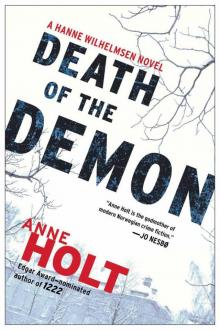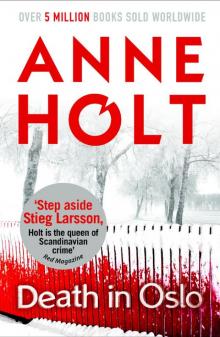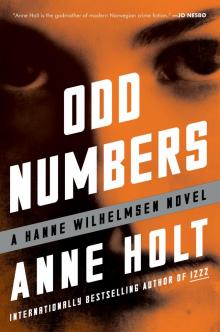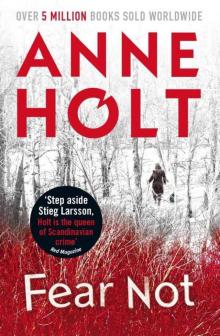Odd Numbers Read online
Page 2
“In the old days, you’d be sprinting over there,” Hanne said, disregarding his comments and switching over to NRK.
“Sprinting?”
“It’s only a few hundred yards from here to Gimle terrasse. You’d reach there before the police. Before the ambulances.”
“I no longer work for the police. I thought you’d have kept track of that much at least.”
“Billy T.”
Her voice sounded despondent, and she turned her wheelchair to face him. NRK had nothing to offer at present: it was broadcasting a repeat of the Norge Rundt magazine program.
“That blast was ferocious. People may be injured. If I hadn’t been stuck in this chair, I’d already be halfway there. People over there must need help.”
He stared at her, his eyes narrowing as he bit a sliver of dry skin on his bottom lip.
“Come back here later,” she said calmly. “Then we can chat. I promise to let you in.”
Billy T. was already at the door.
Taking the stairs, he was breathless before he reached the street.
As Billy T. crossed Bygdøy allé at Gabels gate, zigzagging between cars scarcely able to make any progress in the chaos that had followed the explosion, he was completely out of breath. Reluctantly, he slowed down. His tongue felt dry and metallic, and his lungs were burning. What’s more, he had a terrible stitch and clutched his side. Anyway, it would have been difficult to run any farther on the wide sidewalk. Even though Tuesday was not the busiest of shopping days, customers and shop employees had poured out of the stores and crowded the pedestrian areas. Drivers hesitantly left their stationary vehicles. Two taxi drivers were arguing loudly in the middle of the road, but apart from that, everyone seemed totally confused. No one knew where to go. Most of them looked heavenward, through the still fairly bare horse chestnut trees lining the sidewalk, as if they thought this had something to do with an aircraft bomb. A sobbing elderly woman was given clumsy consolation by a middle-aged man in a suit who kept looking at his watch every five seconds. The sound of sirens intensified.
Billy T. was already regretting this.
He had no business at the crime scene. It would only be a matter of minutes until the police, paramedics, and fire engines would arrive at the NCIN office premises, despite the traffic chaos. They would have more than enough to do trying to keep people away from the place, without him forcing his way through as well. He had come too late. He was useless, just as he had been for many years.
Almost imperceptibly, he slackened his pace.
A young man hurried toward him on the sidewalk, skirting the brown brick buildings.
His complexion was darker than that of most Norwegians, and below the worn, open windbreaker, he was wearing a rifle-green tunic and wide trousers above grubby sneakers. One of the laces had loosened. His beard was short and untrimmed at the edges: it had grown too far up on his cheekbones and down over his neck.
The only person in the whole of Bygdøy allé walking away from the explosion.
Five years had elapsed since Billy T. had left the police force. Probably he had not had any choice. Instead of waiting for a decision to be made in the three disciplinary cases brought against him in just the last four months of his career, he had handed in his resignation in June 2009 and quit. After all, it looked better to prospective employers that he had stepped down of his own volition.
The problem was that he had never really stopped.
He rapidly estimated his distance from the young man, letting his eyes scan 180 degrees from side to side, and before the youth had taken another step, Billy T. was aware of exactly how many people were standing on the broad sidewalk. Which cars had illegally cut across to park on the pavement and which were stuck in traffic. He had calculated the speed and imminent positions of all potentially moving objects for a hundred yards ahead. Without needing to think about it, he took a long step forward and across to the left.
“Hey, you!”
Billy T. strode single-mindedly toward the young man, preparing to block him if he broke into a run.
“Me?”
The young guy stopped and tapped his chest.
“Do you mean me?”
“Yes. Where are you going? What are . . . but . . . Shazad? Is it you?”
The man’s eyes flickered. Billy T. was immediately in front of him now. Increasingly, passersby were paying attention to their conversation.
“I thought I should get away from here,” Shazad said, sounding tense.
“Where are you going?”
“Home. Don’t really think this is any place for me, you see.”
“To be honest,” Billy T. began, in a low voice, “I think you should keep close to me right now. Come on.”
He laid his arm on the boy’s narrow shoulders, probably ten inches below his own. Decisively he turned his back on the group of women who had gathered and started to walk back toward Gabels gate. The traffic lights had changed to blinking amber, as if they had capitulated to the unmanageable gridlock.
“The police ought to see to that guy there,” shouted a man in designer jeans and a tight leather jacket. “Hey! You over there! Those fuckers have blown up half of Frogner!”
Out of the corner of his right eye, Billy T. noticed three men coming at him from one side at full tilt. They had emerged from the photography store on the corner, one of them holding a camera tripod in his right hand.
“Stop!” yelled the guy in the leather jacket, picking up speed.
The din from the sirens grew deafening. On the opposite side of the street, Billy T. caught sight of two patrol motorbikes and all at once was uncertain whether he felt relieved or scared. Shazad, who until now had drawn increasingly close to him, tore himself free by stopping, twisting around, and ducking underneath Billy T.’s arm. As the first of the motorbikes reached the pedestrian area, accelerating when a fifty-yard gap opened up in the line of vehicles, Shazad had already bolted.
The police officer struggled to turn the bike away. The heavy two-wheeler skidded and toppled, still continuing its trajectory on its side. Billy T. stood absolutely still. Said nothing. Did not shout. No one did. In the cacophony of sirens constantly closing in, the motorbike’s front wheel caught Shazad’s legs just above the ankle. They both snapped like twigs before his body was thrown up in a somersault to land a dozen feet away on the hood of a BMW X5.
The three men from the photography store retreated along the sidewalk. The policeman on the wrecked motorbike was assisted by his colleague who, after parking his own in short order, had plunged in.
Billy T. walked slowly toward the BMW.
Shazad’s body lay on its stomach, arms outstretched as if he wanted to embrace the hood. However, his eyes were fixed on something high above in the sky. His feet were dangling from his legs, sprawled at grotesque angles. An extremely overweight woman with steel-gray hair came running with short steps, already wheezing.
“I’m a doctor,” she screamed, shoving aside everyone in her path. “I’m a doctor!”
Ten feet from the car, she came to a sudden halt.
Billy T. wanted more than anything else to turn the corpse’s head back into place. Opening his mouth, he took a deep breath and ran his thumb and index finger over the corners of his mouth, muttering something no one heard.
“Billy T.,” somebody said. “What are you doing here?”
The last policeman to arrive on the scene had lifted the visor of his helmet. His colleague sat on the ground a short distance away with his knees raised, using his helmet for support at the small of his back. Although grimacing, he appeared to have emerged unscathed from the accident.
“Gundersen,” Billy T. replied, nodding in recognition, though he did not offer his hand.
“What happened? Who the hell is . . . what have we here?”
The police officer pointed at a bulge underneath the boy’s tunic.
“This is Shazad Beheshdi.”
“What? I was more meaning this here.�
�
Sergeant Gundersen grabbed a corner of the tunic. It was caught in the zip of the young man’s jacket, and he had to remove his gloves and use both hands to free it.
“Shouldn’t really interfere with it too much,” Billy T. said softly. “Maybe best to take some photographs first?”
“What’s this?”
Gundersen pulled a plastic toy from the loose-fitting garment.
“Darth Vader,” he answered himself and studied the figure more closely. “That’s something. A fucking toy!”
It was perhaps a foot tall and seemed carefully constructed. The control panel on its chest was precise, down to each tiniest detail, and when Billy T. leaned forward to take a better look, he thought he could ascertain that the knobs could be switched off and on. Darth Vader was holding a broken light saber on his right arm.
“What is it that’s happened?” Billy T. asked, without taking his eyes off the figure.
“You know that better than me. Do you know this guy, then? Why did he take off?”
“I mean over there. Gimle terrasse.”
“An explosion. Major incident. In the NCIN office, it says. It’s pretty chaotic, all of it. Can you—?”
He broke off, before suddenly handing Billy T. the Darth Vader model.
“Krogvold over there is probably in a bit of a state.”
He nodded to his colleague who, having risen from the asphalt, seemed to be carefully checking to see if all his bones were intact.
“But he can take care of this case here. Could you help him? I really ought to move on. It looks as if it’s on fire down there—in both meanings of the word.”
He nodded in a westerly direction. Hesitantly, Billy T. accepted the figure.
“There’s not really much I can do. I don’t have a radio, and it should really be called in . . .”
Sergeant Gundersen, already astride his motorbike, was no longer listening to him. He barked a brief order to Krogvold before starting the engine.
Billy T. was still staring at the dark figure.
This was no toy, he realized. It was a collector’s item and would have been valuable if the red light saber had not been damaged. In his time, many years earlier, he had bought one exactly the same as this. In the same pose. The same knobs on the breastplate. Precisely the same kind of cap, made of stiff metallic material that hung in folds.
As Krogvold approached, Billy T. momentarily turned his back on him. His denim jacket was too tight—he would have to buy himself a new one—but he managed all the same to push the model up into his armpit underneath the fleece lining.
Without leave-taking, without waiting, without saying anything to anyone, he calmly began to walk off. Behind him he could hear the policeman ordering people to move farther back. His police radio crackled as he called an ambulance and other assistance, and Billy T. picked up speed. Not until he had reached Frognerveien, just where Kruses gate began, did he stop. He carefully drew out the figure. He had been walking with his arm akimbo all the way to avoid damaging it any more than necessary, and apart from the broken light saber, it was all in one piece.
The helmet could be removed, Billy T. discovered.
Just like the Darth Vader figure he himself had purchased, once upon a time.
His tongue tingled uncomfortably when, unable to delay any longer, he turned the figure upside down. Billy T. made an effort to swallow, but suddenly felt sick.
A name was carved underneath the plinth.
In childish letters drawn with nail scissors: Billy T. could remember how angry he had been that the valuable collector’s item had been taken out of the original packaging and spoiled by a little boy who had been told in no uncertain terms that this far-too-precious gift should sit on a shelf to be looked at.
Linus Bakken, it said, in shaky handwriting. His own son.
Billy T. shoved Darth Vader back under his arm. Looking up, he turned his eyes to the west, where a fat, black pillar stretched up to the sky to merge into the steadily lowering clouds.
The tea light had burned down, and the sooty wisp of smoke that swirled up to the ceiling made Hanne lean forward and use two fingers to pinch the reeking wick.
“You’re very late,” she said to Billy T.
“Yes.”
“Tea? A beer?”
“Nothing, thanks. I have this.”
Lethargically waving a bottle of Cola Light, he plopped down into an armchair.
The TV was muted. Hanne’s gaze did not waver from the screen. The images from Gimle terrasse were shocking. Although the press had obviously been chased farther away, once the police had succeeded in marshaling themselves around the explosion site, there was a continual flow of pictures snapped on smartphones in the dragging minutes when everything had been in disarray. Many passersby had come so close to the NCIN premises that corpses and body parts had to be censored before the shots were transmitted.
“Did you manage to do anything?” she asked.
“What?”
“There.”
She nodded at the screen.
“No. I never got that far.”
Shaking his head, he looked around the enormous living room, so recently decorated that a scent of new wood rose from the floor.
“Quite a place,” he mumbled. “I remembered it was nice, but now it’s even more impressive. I know Nefis has money, but what on earth did all this actually cost?”
Hanne grabbed the remote control. All of a sudden, sound poured out of the panel that ran the entire length of the TV set. The broadcast had transferred to the studio, where hastily summoned experts on everything from bombs to extremism were arrayed, with serious expressions, around a half-moon-shaped counter. Hanne smacked her lips in consternation when she noticed that Kari Thue had also been invited, as the only woman in the group.
“That harridan’s paranoid,” Billy T. said, opening his bottle to an eruption of fizz. “Off her head. People like that will give grist to the mill if it actually turns out that it’s Muslims who’ve attacked their own kind. At least that’s the theory, as far as I understand. Poor fuckers. They always get the blame. Last time, when the government and youth wing of the Labor Party were the targets, everyone thought it was them until that pathetic slimeball from the West End was identified. Now, when the attack hits the Muslims, they’re damn well getting the blame again.”
Hanne did not reply. She had experienced the doubtful pleasure of spending a few dramatic days at Finse, in Kari Thue’s fanatically anti-Islamic company, seven years earlier. The train on which they had both been traveling had derailed near the tunnel through Finsenut. Two people were murdered while they all remained stormbound in isolation at the hotel, Finse 1222, and Hanne’s antipathy to the shrew had been so strong that she had initially and quite mistakenly suspected her of being behind the killings.
“Nobody knows anything as yet,” she said. “They’re only speculating. They did that first time around as well, in the first few hours, and it’s always a foolish thing to do. You know that well. Keep all possibilities open, as you know. Never get locked into any specific theories. That’s why we were so . . . invincible, you and I.”
She smiled at him, for the first time in more than eleven years. Not a broad smile, and not even a particularly friendly one. But she smiled. He grinned in return.
“Those were the days.”
She nodded curtly, and the smile vanished.
“You needed help, you said. Something about Linus. I can’t fathom how I might be able to help you with anything whatsoever unless you need money. Not that I have so very much, but I can speak to Nefis. She—as you already made a song and dance about—has plenty.”
His eyes narrowed and his movements were ill tempered as he returned the lid to the bottle.
“What the hell do you take me for? I certainly wouldn’t drag myself along here and humiliate myself in front of every Tom, Dick, and Harry . . .”
The bottle pointed in the direction of the apartment next door.
“. . . just to ask you for money! Or, even worse, to ask your wife for money!”
Hanne shrugged indifferently. Once again she reduced the volume on the TV but without switching it off entirely. Billy T. stared at her as if searching for something, but instead of looking at him, she appeared to be watching the broadcast.
He was not the only one who had changed over the years. Hanne’s hair was graying, especially at the temples. Shoulder length, it had lopsided bangs that kept falling over one eye. Before that fateful day between Christmas and New Year in 2002, when she had stormed into a cottage in Nordmarka and been shot by a perfidious policeman, she had begun to struggle with her weight. Now she was slim, almost skinny. Her nose seemed sharper than before and her cheekbones higher. Her narrow hands were sinewy, with dark-blue veins clearly delineated below the fine skin. Her lifeless legs looked like sticks.
Even her eyes had changed, he thought. They were still ice-blue, with the same distinctive black ring around the iris. The whites of her eyes were still just as bright, despite her age. Billy T. could not quite grasp what was different. Not until she suddenly gazed directly at him and asked: “Okay. If you’re not begging for money, then what’s this about?”
He froze.
They had been friends in their student days and close colleagues, Hanne Wilhelmsen and Billy T. They had been friends—more than friends, and at one time almost a couple. One night she had come closer to him than any other person had ever managed to do. She had often rejected him. Hurt him. Withdrawn into herself, gone off, and driven him to distraction with her silences and undue secretiveness.
But she had never met him with coldness. She had never mocked him like this.
He lowered his eyes.
“What actually happened to you?” he asked, once he was sure his voice would carry.
“Me? I was shot. My spine was damaged. Left the police. Water under the bridge.”
“I just don’t understand it. After all these years. All we had. And then just . . .”
He tried to click his fingers, but couldn’t manage to produce a sound.

 A Grave for Two
A Grave for Two Dead Joker
Dead Joker Death of the Demon: A Hanne Wilhelmsen Novel
Death of the Demon: A Hanne Wilhelmsen Novel Punishment aka What Is Mine
Punishment aka What Is Mine Beyond the Truth
Beyond the Truth Death in Oslo
Death in Oslo The Blind Goddess
The Blind Goddess What Never Happens
What Never Happens 1222
1222 In Dust and Ashes
In Dust and Ashes Odd Numbers
Odd Numbers What is Mine
What is Mine What Dark Clouds Hide
What Dark Clouds Hide Blessed Are Those Who Thirst
Blessed Are Those Who Thirst Fear Not
Fear Not No Echo
No Echo Hanne Wilhelmsen - 01 - The Blind Goddess
Hanne Wilhelmsen - 01 - The Blind Goddess